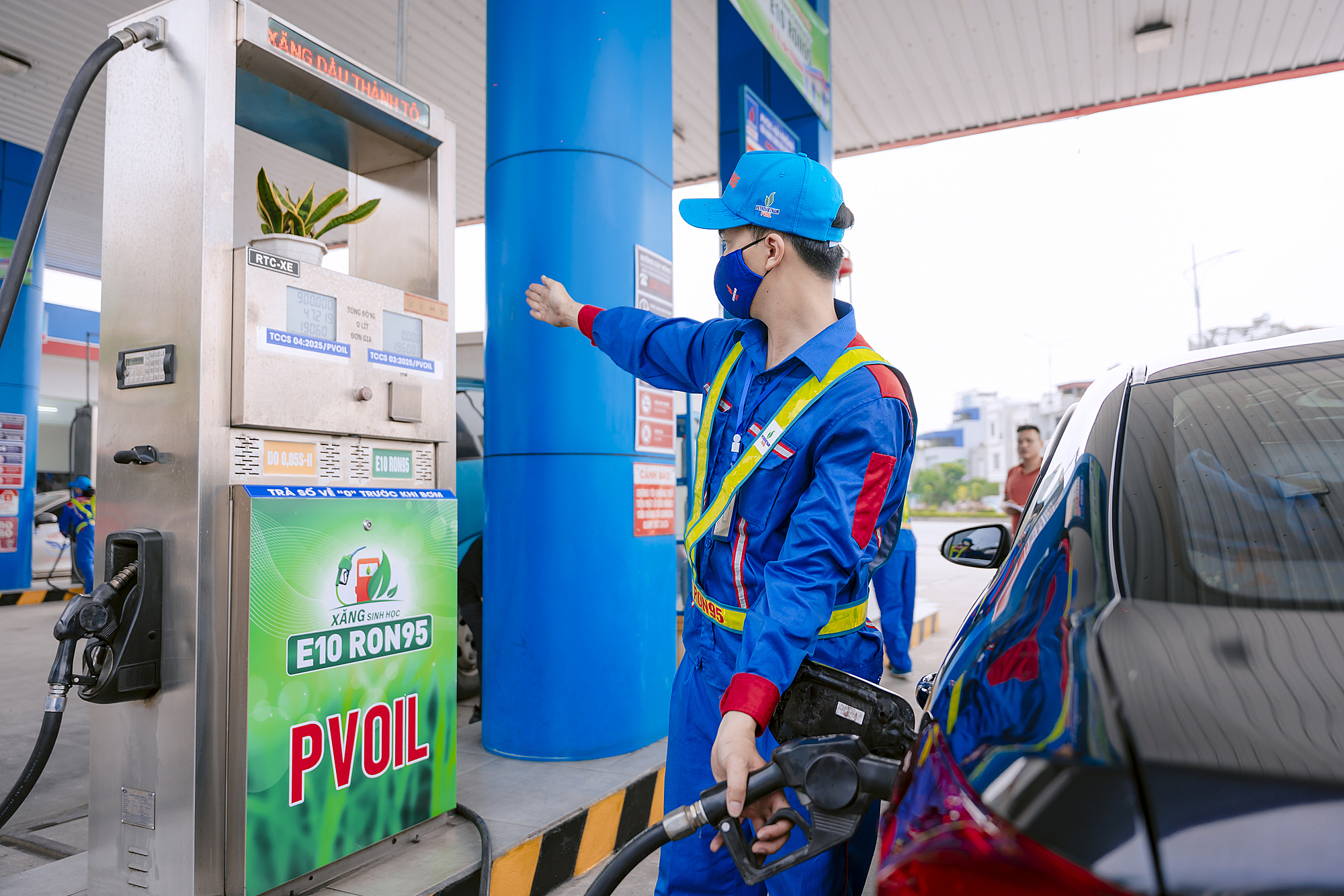The Ministry of Industry and Trade has proposed that all traditional gasoline (RON 92, RON 95, and other mineral grades) be blended with E100 to create E10 biofuel for nationwide use in motor vehicles, according to a draft circular on the biofuel blending roadmap.
After 2030, all gasoline blended and sold for motor vehicles nationwide will transition to E15 (14-15% ethanol) or another biofuel blend ratio stipulated by the Minister of Industry and Trade.
Organizations and individuals are encouraged to produce, blend, distribute, and use B5 and B10 biodiesel. Aviation fuel and special gasoline and oil used by the military and police for national defense and security are exempt from this mandate.
The governing body plans to introduce regulations mandating the blending of E100 into all gasoline sold (E10). The draft also stipulates that local authorities must cooperate with the Ministry of Industry and Trade to inspect, monitor, and address violations in implementing the biofuel blending roadmap.
 |
E10 biofuel pilot program in Hanoi, 8/2025. Photo: Xuan Hai
Seven years ago, Vietnam stopped distributing traditional RON 92 gasoline and switched to E5 RON 92 for road vehicles. As a result, from 2015 to 2019, the consumption rate of E5 RON 92 increased from 0% to over 40% of the total domestic gasoline consumption (including E5 RON 92 and RON 95).
However, since 2020, E5 RON 92 consumption has steadily declined, accounting for approximately 15-50% of total consumption in various localities. Some retail stations have stopped distributing this type of gasoline.
According to the Ministry of Industry and Trade, the reason for this decline is due to biofuel's susceptibility to water absorption and evaporation, making it difficult to store. Tax and fee policies have not created a sufficient price difference to encourage consumption. Insufficient media coverage has failed to dispel concerns about potential "engine damage", and the lack of monitoring and enforcement mechanisms has also hindered E5's market position.
The Ministry of Industry and Trade believes that as Vietnam transitions towards a greener and more sustainable future, E10 biofuel is an effective energy transition solution. It aligns with the current context and domestic resources, and anticipates international trends.
In addition to environmental benefits, increased biofuel use will help revive previously invested biofuel plants that are currently idle due to a lack of market demand. This will prevent wasted investment resources and promote the development of raw material areas (cassava, corn), creating jobs for a large number of workers in mountainous and midland regions.
In the current global trade landscape, increased biofuel use also creates market opportunities for ethanol imports, particularly from the US. The Ministry of Industry and Trade views this as a quick and effective solution to increase imports from the US and move towards trade balance.
The Ministry of Industry and Trade affirms Vietnam's capacity to produce, import, and blend enough ethanol to implement the mandatory E10 program by 1/1/2026. Based on the total gasoline demand of approximately 15 million m³ in 2024, the country will need an estimated 1.5 million m³ of E100 annually for blending.
Vietnam currently has six ethanol (E100) plants with a total design capacity of approximately 600,000 m³ per year. Operating at full capacity, these plants will meet approximately 40% of the ethanol demand for E10 blending. The remaining demand can be met through imports from the US and Brazil, the world's two largest ethanol producers.
Regarding blending infrastructure, the Ministry of Industry and Trade stated that the Vietnam National Petroleum Group (Petrolimex) and the Vietnam Oil Corporation (PVOIL) have sufficient capacity. Other companies such as BSR (Dung Quat) and Saigon Petro have also prepared their infrastructure and are capable of participating in the blending process.
"In terms of production, import, and blending capacity, Vietnam is fully capable of implementing the mandatory E10 program from 1/1/2026," the Ministry of Industry and Trade affirmed.
According to the draft, during implementation, the Ministry will cooperate with the Ministry of Finance to manage price and tax policies and supervise distribution. The People's Committees of provinces and cities are tasked with supporting raw material areas, blending infrastructure, and local communication efforts. Production enterprises are responsible for restoring ethanol plants, importing to offset shortages, and ensuring E10 quality before circulation.
Phuong Dung












